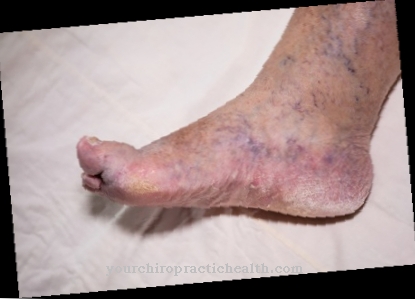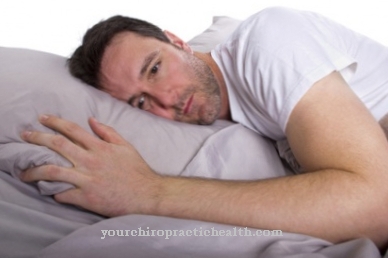From a medical point of view, bowel movements two to three times a week should be considered normal. Irregular bowel movements occurs when constipation, diarrhea or other abnormalities occur over a long period of time.
What is irregular bowel movements?

Irregular bowel movements can have a variety of causes. Food intolerance, insufficient intake of fiber or fluids, and acute or chronic inflammation of the gastrointestinal tract are some of the factors.
Irregular bowel movements are also favored by psychological factors such as stress or changes in living conditions. If you have irregular bowel movements for a long time, it is advisable to get medical help.
If irregular bowel movements manifest themselves in a recurring alternation of constipation and diarrhea, this could also be an indication of a tumor in the intestine. A medical examination can clarify this.
causes
Constipation (constipation) occurs when the body is fed one-sided, low-fiber and high-sugar food. Decreased intake of water or other clear liquids as well as a lack of exercise lead to constipation.
Diarrhea is often observed in the case of intolerance to lactose, fructose, wheat and other foods. Irregular bowel movements can also result from a malfunction of the pancreas, liver, gall bladder, or other organs.
A constant alternation of diarrhea and constipation should be viewed as a serious symptom and medically clarified in order to identify and treat inflammation or other changes in the digestive tract at an early stage.
You can find your medication here
➔ Medicines for constipation and intestinal problemsDiseases with this symptom
- Crohn's disease
- Irritable bowel syndrome
- Ulcerative colitis
- Intestinal polyps
- Proctitis
- Food intolerance
Diagnosis & course
Irregular bowel movements can be treated efficiently with the right examination methods and associated diagnoses. A detailed survey of living conditions, eating habits, medical history and family-related illnesses may provide the first information.
Elimination diets, blood tests and urine and stool samples are also carried out. Imaging methods such as X-rays, CT and MRT examinations and reflections of the gastrointestinal tract provide the final information. A thin tube with a small camera is inserted orally and anally into the patient.
The smallest changes in the stomach and intestines can be recognized and treated quickly. For example, if there are small intestinal polyps, these can be removed painlessly for the patient during the examination.
Complications
Irregular bowel movements are generally harmless, but complications can arise as soon as constipation occurs. Constipation is often associated with gas and bloating. A feeling of fullness can lead to loss of appetite and consequently to unwanted weight loss.
Constant flatulence is often painful and also affects the quality of life, as the body can usually no longer evacuate the excess gases unnoticed. Instead, the intestinal gases are diverted loudly and often with an intense odor via the anus. As a rule, this does not cause any further medical concern, but it does lead to the social isolation of the person concerned.
Irregular stools tend to be very firm, which can lead to a number of complications. The strong pressure when defecating leads to a build-up of blood in the hemorrhoids, which thereby enlarge. This often leads to burning and itching in the anus area, which must be treated with creams and ointments.
In severe cases, surgery on the hemorrhoids may also be necessary. Regular heavy pressing when defecating can also cause injuries in the anal area. The mucous membrane can tear and become inflamed. In addition, painful cracks and fissures can form on the anus.
When should you go to the doctor?
The bowel movement comes very regularly for some people and not for others. Depending on your diet and other factors, this is normal and not a reason to see a doctor. The regularity of bowel movements depends on changes that deviate from the usual pattern. A patient who previously had regular bowel movements and now only needs to go to the toilet every few days, has frequent constipation or diarrhea, or notices other accompanying symptoms should see a doctor to clarify the cause.
It could be something harmless, such as food that is poorly tolerated. In rare cases, irregular bowel movements can also indicate physical illnesses, which can then be detected. In these cases it usually occurs with accompanying symptoms, but only the doctor can determine the cause. It is noticeable if the bowel movements are irregular and less frequent than usual. This can also have various reasons and should be clarified by a doctor if the condition persists for a long time and is possibly accompanied by further symptoms.
At best, the doctor determines that the diet is not consistent and should be changed so that the bowel movements can return to normal. By visiting a doctor in good time, a physical illness can also be diagnosed in good time and treated without major difficulties.
Doctors & therapists in your area
Treatment & Therapy
Irregular bowel movements are treated based on the cause. If the studies show that psychological factors can be considered as triggers, accompanying psychotherapeutic treatment or a change in living conditions is indicated.
Irregular bowel movements caused by the consumption of certain foods can be treated by changing your eating habits. On the other hand, if it is physical changes that have caused irregular bowel movements, drug or even surgical treatment is unavoidable.
In addition to a detailed survey of the medical history, differential diagnostic blood, urine and fecal examinations, gastroscopy and colonoscopy are also important diagnostic methods. The digestive tract can be examined in detail using small cameras attached to thin tubes.
The examination is usually painless and, if desired, can also be performed under local anesthesia. A longer stay in the hospital is not necessary, as the examination takes less than an hour on average and is carried out in many local doctor's offices.
Irregular bowel movements - depending on the cause - can be treated by administering digestive or anti-inflammatory drugs that support the digestive organs. Strict avoidance of foods that may be causative factors can also promote regular bowel movements.
If the tissue has already been permanently damaged by inflammation or other harmful processes, surgery may be necessary. Depending on the scope, this can also be done on an outpatient basis and is then usually painless and uncomplicated for the patient.
Outlook & forecast
If the differential diagnosis does not reveal any worrisome causes for irregular bowel movements, the affected person is challenged. Apparently he was concerned about the lack of regular bowel movements. After all, the person affected now knows whether it is diet-related or age-related constipation or the consequences of an overgrowth.
The prognosis for this disorder is good. The intestinal peristalsis can be stimulated by various measures. High-fiber diet, sufficient drinking water intake and more exercise are helpful. In addition, dried plums can be eaten and abdominal massages can be performed. The treating doctor should be discussed about the short-term use of laxatives. In general, a habituation effect can be assumed with such agents. That is why natural measures make more sense in the long term.
Incidentally, stool removal does not have to work according to a fixed schedule. Taking down a chair once a day is desirable, but it is okay to have a chair lift every two days. If the stool passes less than every two days, an examination is useful.
As a result, emotional problems with going to the toilet can also be diagnosed. For example, some people shy away from relieving themselves in other people's toilets. This may be due to poor hygiene or other causes. It is important that such mental and emotional blockages are broken down. The organism must have a free run in the disposal of waste.
You can find your medication here
➔ Medicines for constipation and intestinal problemsprevention
Irregular bowel movements can be avoided through a healthy lifestyle and conscious eating habits. Eating too much meat, overconsuming sugar, irritants like caffeine, nicotine, and alcohol, lacking fluids, and lack of exercise are all easy to fix circumstances. Genetically determined risk factors can also be contained in this way. Irregular bowel movements that have already arisen due to organically damaged organ structures should be carefully monitored and treated medically. Irregular bowel movements should always be seen as an alarm signal to take a critical look at your own living conditions.
You can do that yourself
Irregular bowel movements can be a major burden in everyday life. But there are some interventions that can help with this problem.Digestion can be significantly influenced by diet. In order to ensure optimal gastrointestinal activity, it is important to eat variedly. In addition, regular meals should be eaten throughout the day. Fasting for too long or eating too often interferes with the activity of the intestine in the long run.
To prevent or eliminate irregular bowel movements, it is advisable to limit the consumption of processed products and sugar. In addition, meat should not be consumed every day of the week. If possible, poisons like nicotine and alcohol should be consumed as little as possible. Diets high in fiber can help with constipation. High-fiber foods include legumes such as lentils and chickpeas. Fruits and vegetables should be eaten several times a day. These not only provide essential minerals and vitamins but also stimulate digestion.
Irregular bowel movements can also be the result of physical inactivity. In order to keep the body fit and to support it in its function, it is therefore advisable to exercise regularly. Endurance sports such as swimming, jogging or cycling are particularly suitable. But even short walks at a slower pace stimulate intestinal peristalsis and thus stool production.













.jpg)

.jpg)
.jpg)











.jpg)